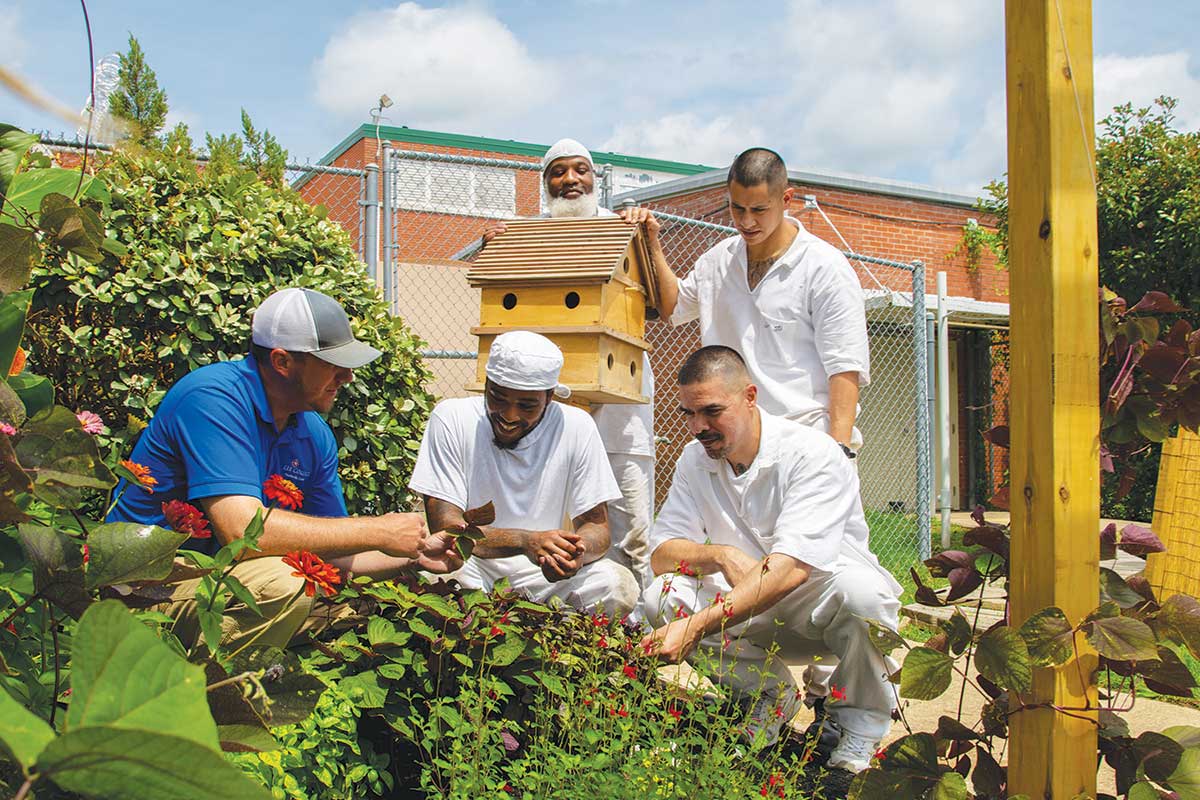For many people, being sentenced to years in prison might mean the end of some of their life goals and plans. But a unique, and literally groundbreaking, program within the Texas Department of Criminal Justice has helped formerly incarcerated people turn their lives around.
The program is offered by Lee College and implemented at the Ellis Unit in Huntsville and other locations. It gives people in prison the chance to learn about horticulture and develop knowledge and skills that can be used in the outside world upon their release.
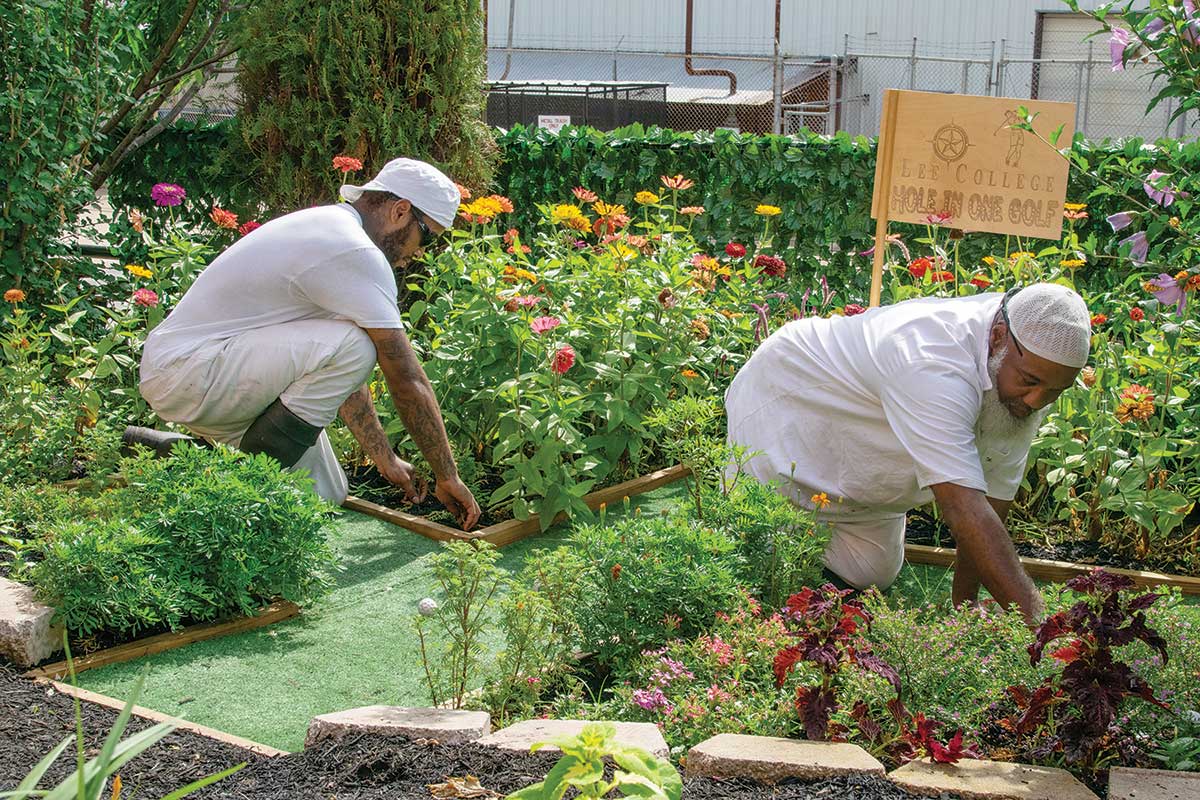
Spread over 2 acres, plants flourish thanks to daily tending by incarcerated students in the horticulture program at TDCJ’s Ellis Unit.
The program has operated for decades but has blossomed, so to speak, under the guidance of Scooter Langley. The horticulture instructor from Lee College spends his days not in a traditional classroom but in the highly guarded confines of a prison.
“Fourteen years, that’s how long I’ve been teaching for Lee College,” Langley said. “Previously my dad ran the horticulture program for 31 years. I never expected to be teaching in the prison. I wanted to be in the horticulture industry but didn’t know that I was going to go this route. When my dad retired after 31 years, I picked up where he left off.”
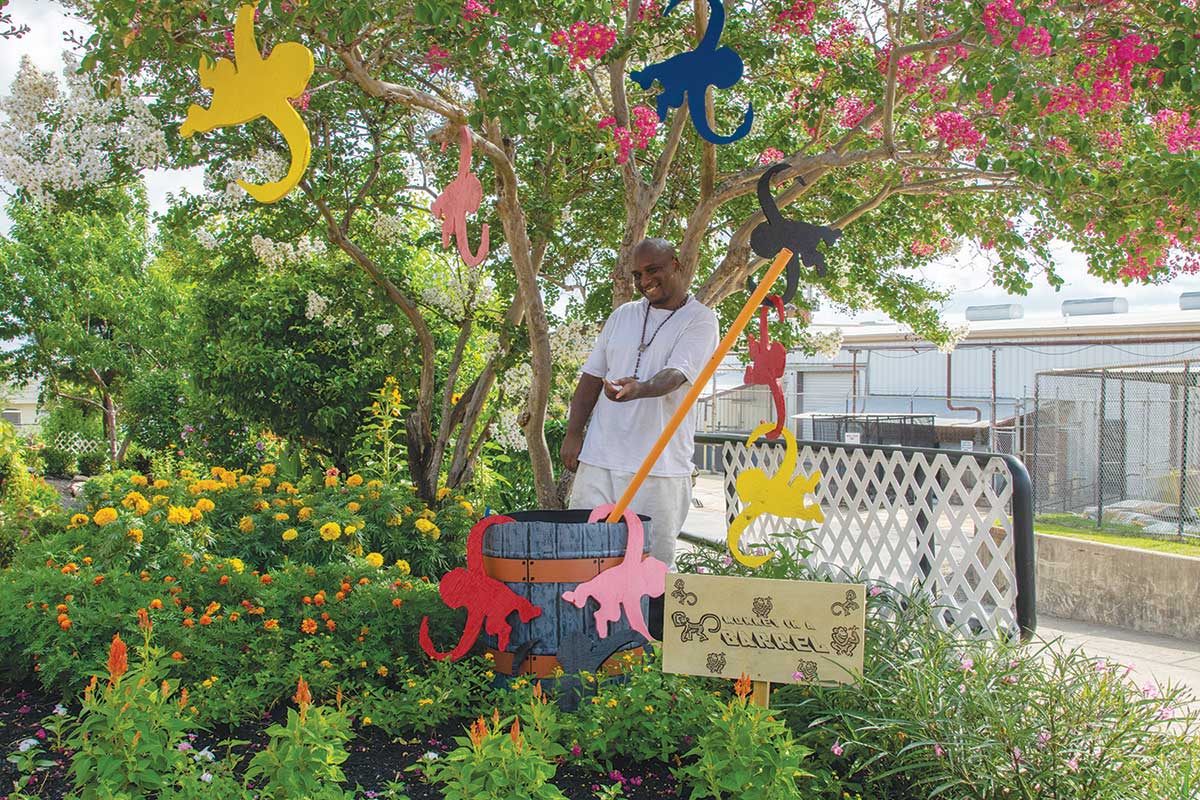
Incarcerated students express a sense of humor with their monkey-shaped plant hangers.
Lee College has long worked with TDCJ. While its main campus is in Baytown, the college has a satellite hub in Huntsville, where the faculty go to local prisons to teach academics and technical programs on heating and air conditioning systems, truck driving, culinary arts, logistics, and cabinetmaking as well as horticulture, which seems to draw the most students.
“There is always an endless supply of students for the program,” Langley said. “The students have to pay just like going to any other school. They can either get a loan or they can get a grant such as a Pell Grant, or their families can pay for it.”

A bonsai garden designed by the program’s students.
One might imagine that it can be difficult to get a Pell Grant while serving a prison sentence, but it’s not that hard, according to Langley. “Lee College was granted access to Pell Grants,” he said. “So if inmates apply and meet the qualifications, they can get grants to go to school. It’s just like going to any other school.”
Langley looks for students who are closer to their release date to enroll in the yearlong program. He said it’s difficult for someone who may have 40 years left because of the ever-changing world of horticulture. New technology, pricing and trends can evolve, making it difficult for someone to be up-to-date decades after completing the program.
Incarcerated students receive certifications in several areas in addition to the knowledge and hands-on experience from the course, making it easier to find employment once they get out.
“We offer the Texas master naturalist certification, master gardener certification and training from Texas Parks and Wildlife Department instructors who help certify these guys as water conservationists,” Langley said. “We also just started doing a forklift certification to help them land a better career.”
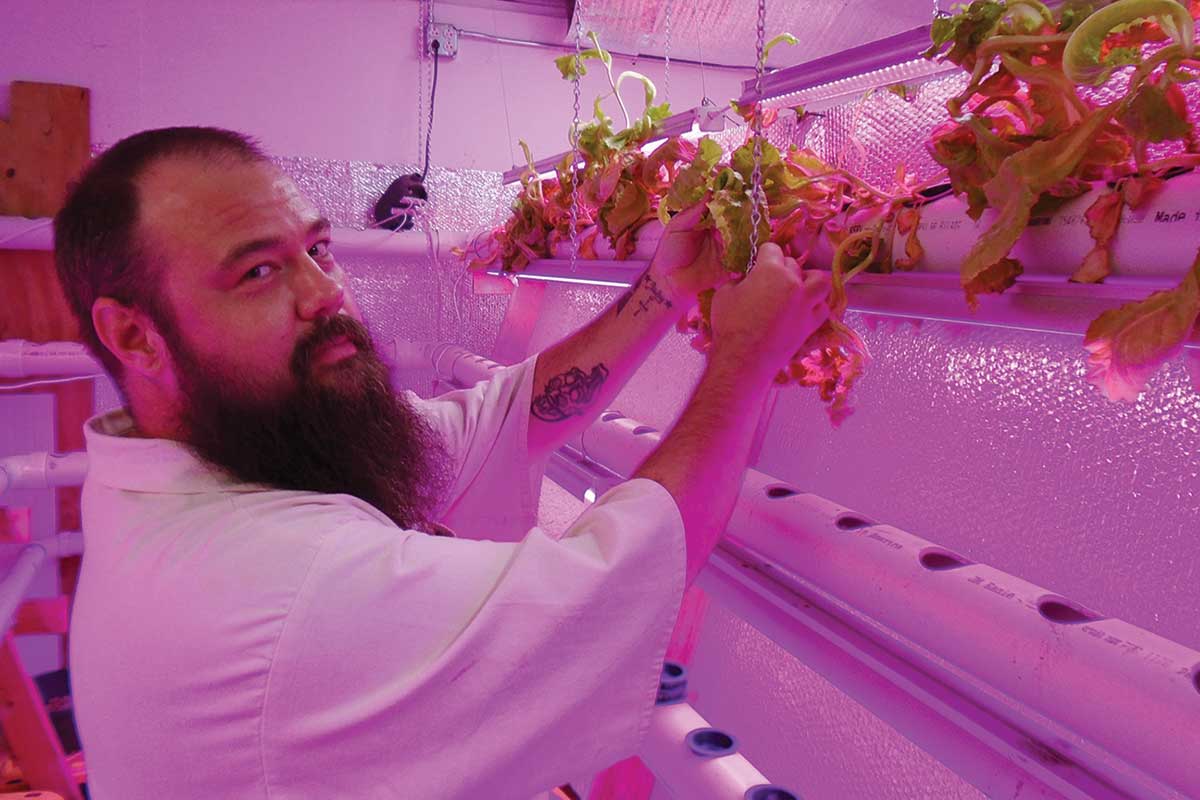
Built entirely by incarcerated students, the aquaponic and hydroponic growing sections use natural fertilizer from various fish species.
The Texas master naturalist training is probably the highlight of the year for many of the incarcerated students since they receive training from TPWD master gardeners and master naturalists. The Texas A&M AgriLife Extension Office provides volunteer speakers as does the Trinity River Authority. Each volunteer must undergo extensive security checks before entering the prison. Pockets must be emptied, cellphones and cameras are left outside, and thorough pat-downs are completed before visitors can enter the prison garden area.
The incarcerated students are also involved in the Friends of Lake Livingston replanting project, which began in 2014 and was featured in Texas Co-op Power magazine in July 2017. Project participants have planted American water willows at 21 sites across the lake to reduce erosion and provide habitat for fish and other aquatic life.
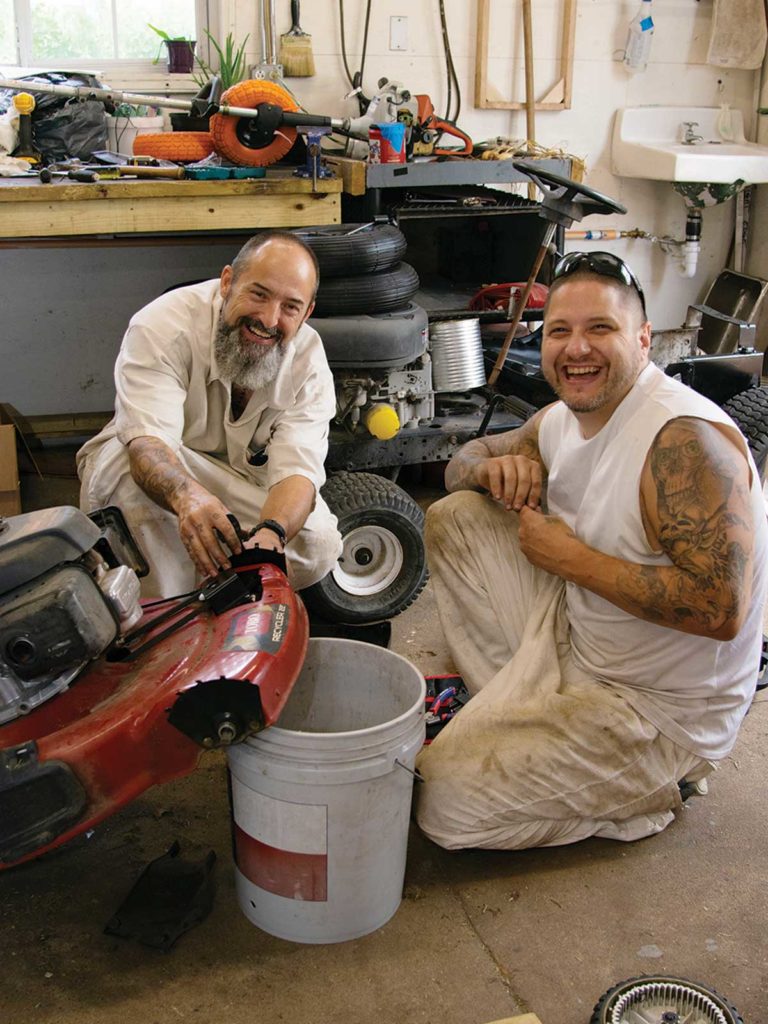
As part of the prison horticulture program, students can take classes in small engine repair—yet another skill they can take advantage of upon release.
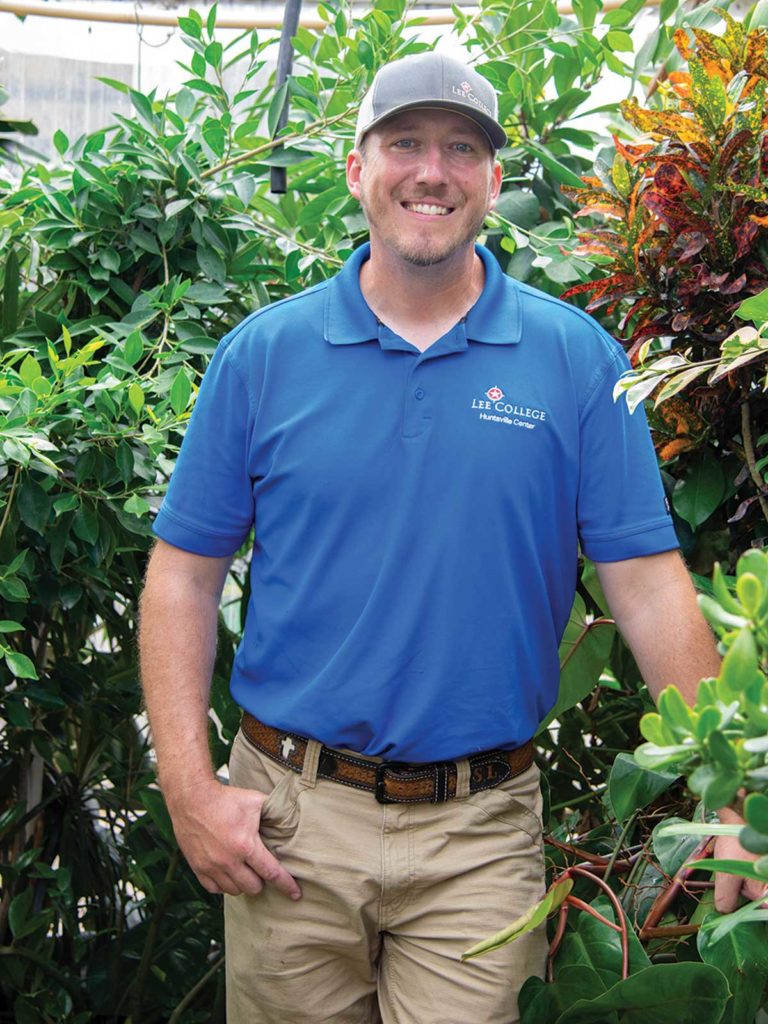
Scooter Langley is the head instructor for the horticulture program at TDCJ’s Ellis Unit in Huntsville and has been teaching in the prison for over 14 years.
“I believe it was in 2016 when Lee College was brought on board to be part of the Friends of Lake Livingston,” Langley said. “We joined to increase the science and research and be part of the broader culture. We also raise the water willows—that’s what our students do. They do research on how to best propagate them, how to best grow them and how to best multiply these plants. Then we get [the plants] to the local schools that participate.”
Langley is proud that the incarcerated students play a large role in the lake plantings. “They feel like they are giving back to society,” he said. “They’ve already taken away from people through the crimes they’ve committed. Now they feel that by being part of this project, they’re giving back to society, helping these high school kids get out there and be involved in conservation work.”

Seed companies from around the country donate to the prison’s horticulture program as part of a landscape design competition.
Quincy Moore is one formerly incarcerated graduate of the program. After being sentenced to 35 years in prison, Moore was granted parole after 18 years. He is now a successful businessman in Houston with an associate degree in horticulture and a business degree. Moore credits the prison horticulture program with turning his life around.
“The program taught us about horticulture, but it also taught us about life,” Moore said. “It showed us how the soil is cultivated, but it also showed us how to cultivate our mind, change our mindset, plant good seeds of thought and nurture those good seeds while surrounding ourselves with people who reminded us of who we were and what we’re striving to become.”
As a result of the new mindset that the program instilled in Moore, he started his own landscaping company after his release and now services some of Houston’s most impressive homes. He also started the nonprofit Effective Revisions (erhtx.org), which is dedicated to helping prevent at-risk young men from ending up in bad situations.
“I’ve taken to teaching young men and even guys that are coming home from prison,” Moore said. “[Effective Revisions] deals with the youth, and it also helps men and women who are coming home get reacclimated with society. I am trying my best to pay it forward with my company.”
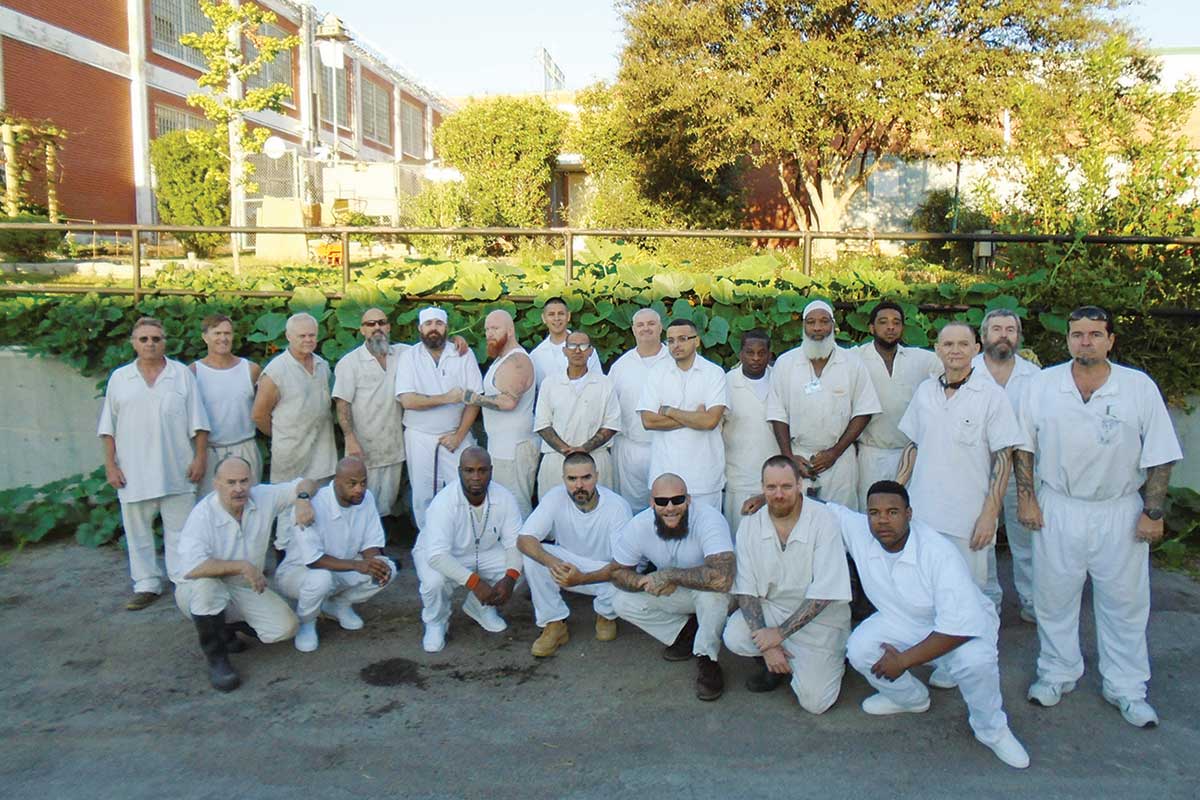
This year’s class consists of 23 students at the maximum- security Ellis Unit in Huntsville.
Moore believes that the right attitude contributes to success on the outside, something that he learned while participating in the horticulture program in prison.
“The program provided me with the opportunity to understand that nothing happens overnight,” Moore said. “You prepare the same way as when you put seeds in the soil. You just don’t throw them out there. You have to prepare yourself just like you do the soil. What it showed me ultimately was that good things take time even if you do the preparation. It may not come out the way that you want, but it doesn’t mean that you didn’t do it correctly. It’s just that some circumstances were out of your control.”

A student wears protective gear while working around the beehive, one of the newest items in Lee College’s horticulture program at TDCJ’s Ellis Unit.
Moore’s desire to succeed helped him start his business. Even if it may be difficult to find employment after release from prison, Langley said that there is help available.
“We have what are called transitional specialists,” Langley said. “We have three of them now, and two of them are former students. They were locked up. They do a lot of great things by doing reentry for students before they get released. When they are released, they try to place these guys in jobs, help them with housing and transportation.”
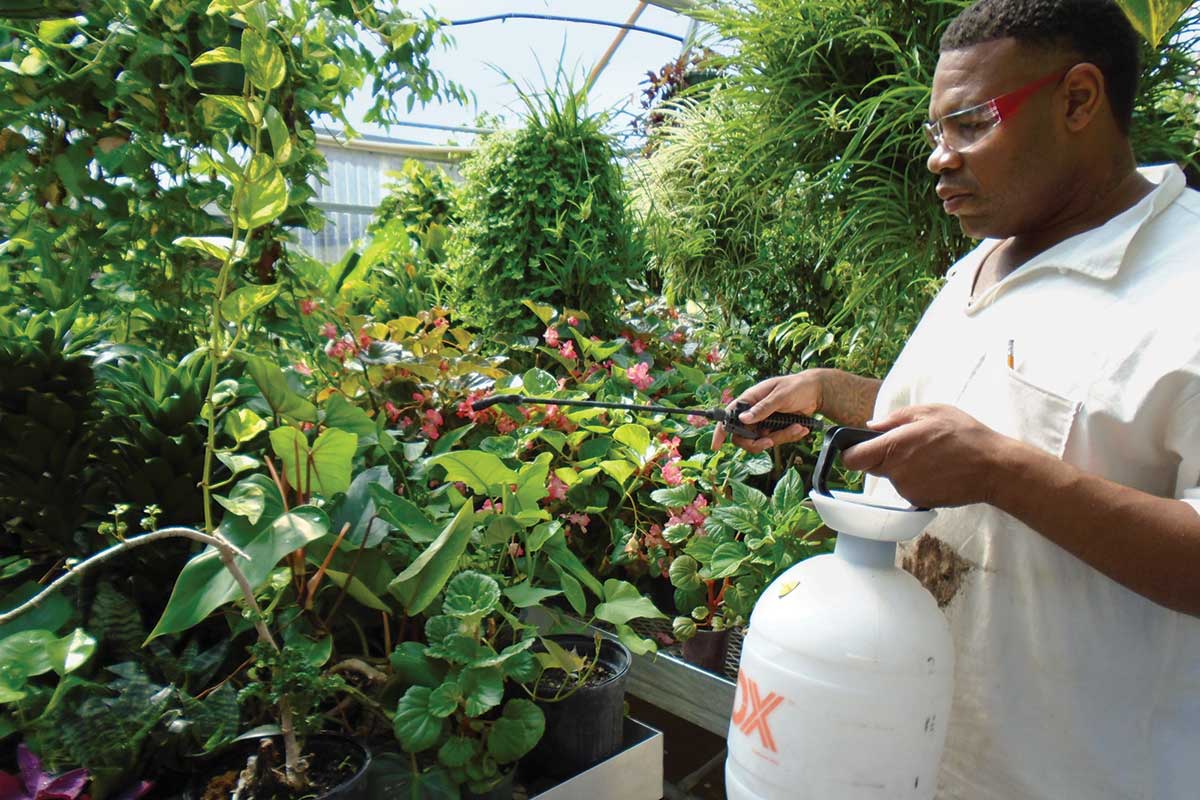
One important aspect of the horticulture program is teaching students how to create and use pesticides using all-natural, nonpolluting ingredients.
Langley credits the program’s success for the lower rate of recidivism among graduates compared to those who don’t take the course. Part of the reason for the low recidivism, according to Langley and Moore, is that the program requires hard work and instills a sense of worth that makes going back to prison not a likely outcome for most of the graduates.
“My students are in the program for one year,” Langley said. “Within that one year, it’s Monday through Friday, six hours a day. They take 10 college classes with me, which are typical college classes that you would get at Sam Houston, Texas A&M or Texas Tech.

An incarcerated student takes just a few minutes to relax and enjoy his gardening handiwork after several hours in the Texas sun.
“We start out with introduction to horticulture. Then they go into landscape design, small farming turfgrass and so on. There are 10 courses they have to work through. When they finish, the inmate-students earn two certificates from Lee College, one for introduction to horticulture and one for landscape design. Many of these guys are working on their associate degrees, and they can then move on to the academic side with English, math and science courses. That’s where they can get their associate of science degree in horticulture.”
Some even go on to get bachelor’s and master’s degrees.
“[One student] went through my program here in prison and got his associate degree,” Langley said. “Then he got his bachelor’s degree in business through Adams State in Colorado. He had to do everything on paper and by snail mail since the inmates have no access to internet or online courses. He was able to get his bachelor’s while he was incarcerated, and now he’s working on his second bachelor’s degree.”
TDCJ allocated several acres to the horticulture program because much of the curriculum involves hands-on planting and landscaping design while students remain inside the maximum security section.
“We have our own landscape areas, and we can landscape every year,” Langley said. “We also have our own vegetable gardens, and we have … the herb gardens, where we raise herbs and spices. Those get harvested by our students, and that’s what’s used at the prison.”
In addition to the landscaping and vegetable and herb gardens, Langley has also introduced hydroponic and aquaponic gardening.
“One is with water and fertilizer, and the other is being fed by koi, catfish or whatever fish that is providing the fertilizer,” Langley said.
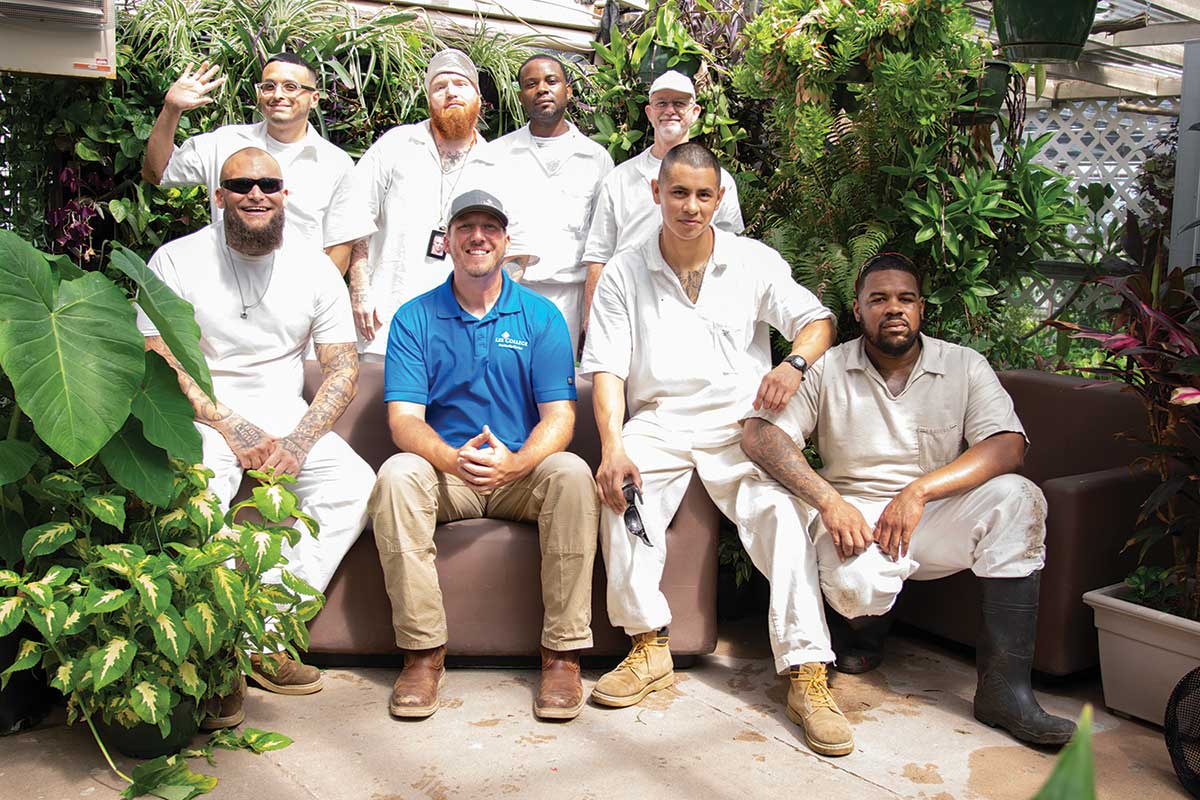
Scooter Langley with some of the horticulture program’s students in one of the prison’s three greenhouses.
“Our most recent addition is beekeeping, used to pollinate the plants and flowers inside the prison yard,” he continued. “We started with one hive, so we’ll see where that takes us. The students take care of the bee colony. The goal is to produce honey that we can sell, though now we use it more for pollination. Hopefully it can lead to a business of harvesting honey for our graduates. Beekeeping is a rapidly growing industry.”
The property also contains three greenhouses, all built by the program’s students, allowing them to grow plants even in winter. “Just because the season changes, we’re still rocking and rolling and trying to provide some kind of outside source of food,” Langley said. “We raise between 300 and 400 head of lettuce each month to provide salads for the officers at the unit.”
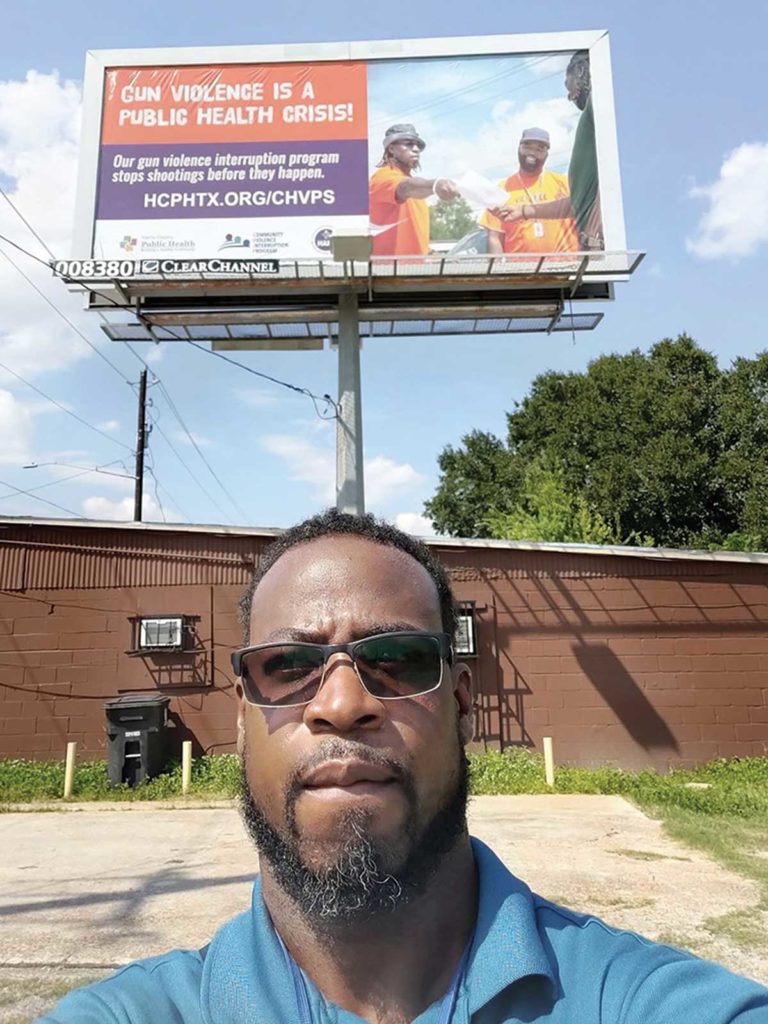
Houston businessman Quincy Moore, who was formerly incarcerated, stands in front of a billboard featuring his nonprofit organization dedicated to reducing community violence.
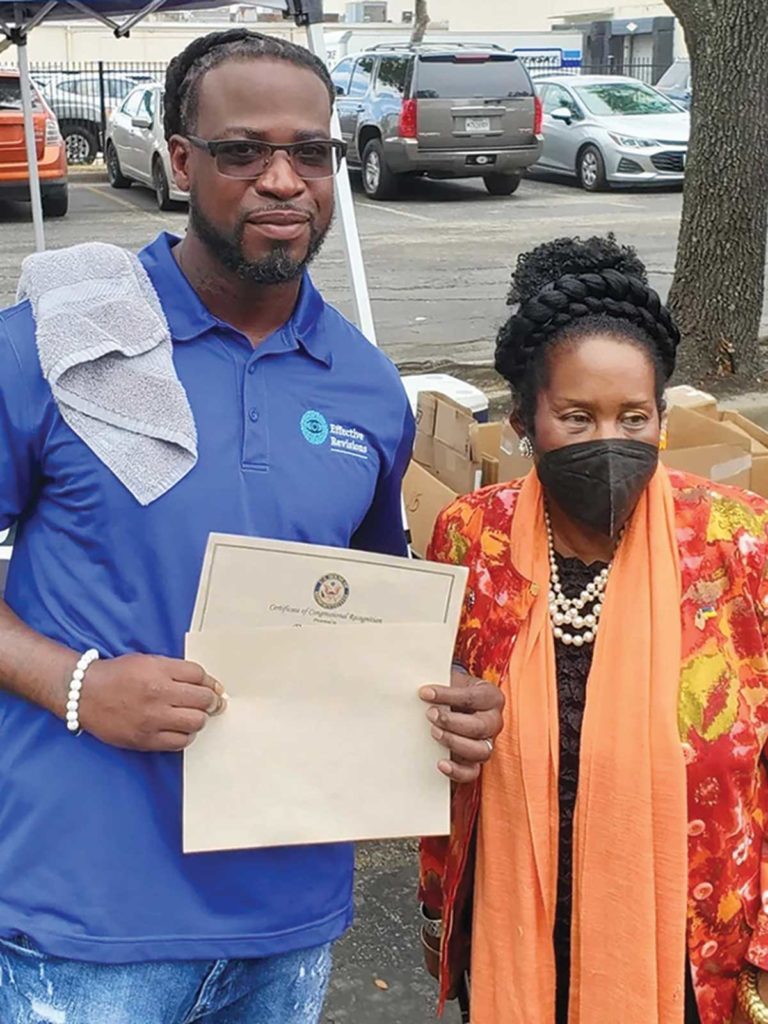
Quincy Moore, left, received a commendation from U.S. Rep. Sheila Jackson Lee for his work with Houston’s at-risk community.
To those on the outside, the program may seem like a minor diversion designed to keep the incarcerated students busy, but it has far more long-reaching effects.
“A lot of these guys may go into a career other than horticulture,” Langley said. “But they can always lean back on horticulture, maybe in a way of having their own garden, maybe taking care of a family member’s landscape, or maybe that degree helped them take another avenue. We’re hoping that what they’ve learned from us, they’re going to take it to the free world and run with it.”
